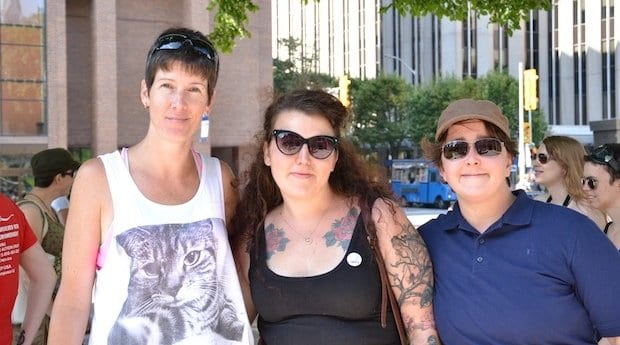
Ottawa Dyke March organizers Joanne Bradley (left), Sarah Manns and Nicole McRae. Credit: Julie Cruikshank
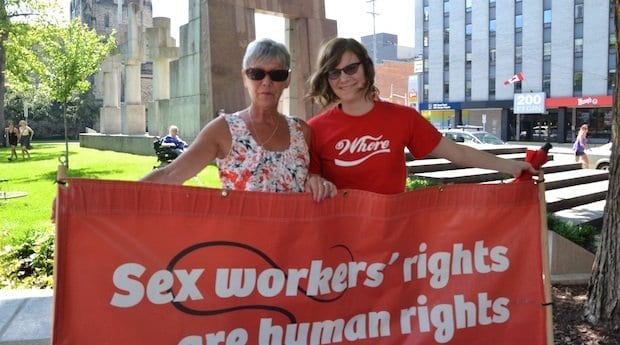
POWER vice-chair Katherine Van Meyl (right) attended the Dyke March with her mother. Credit: Julie Cruikshank
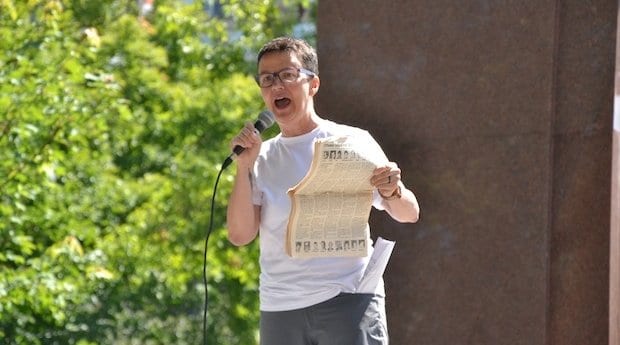
City council candidate Catherine McKenney attended the march with her wife and daughter. She told the crowd that she decided to run for office because she believes Ottawa's city council needs more strong women. Credit: Julie Cruikshank

Amanda Ryan, of Gender Mosaic, says she feels the trans community is well represented at Pride in Ottawa. Credit: Julie Cruikshank
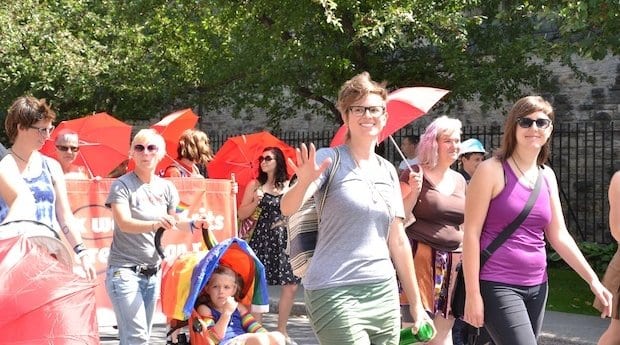
Many queer parents brought their children to the march. Credit: Julie Cruikshank
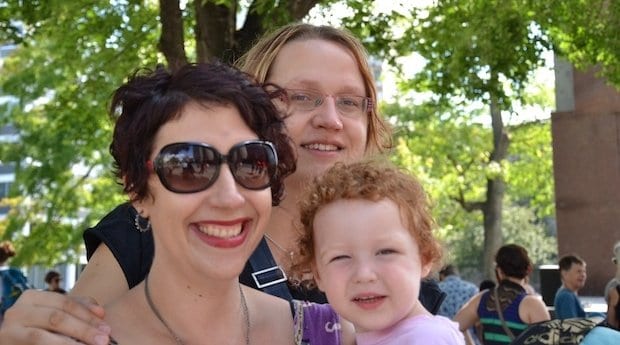
Ariel Troster (left) and Caitlyn Pascal attended the march with their two-year-old daughter, Daphne. Credit: Julie Cruikshank
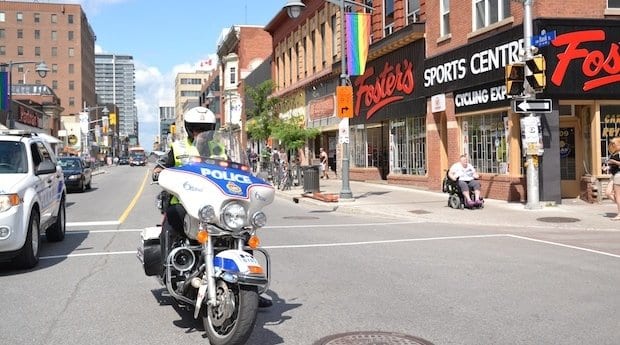
Ottawa police were present at the Dyke March as per a bylaw that states they must be present at all public events on city streets. Organizers say they would prefer the police use bicycles next year. Credit: Julie Cruikshank
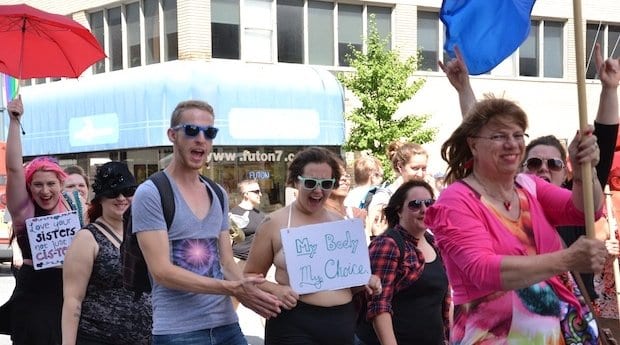
Ottawa Dyke March 2014. Credit: Julie Cruikshank
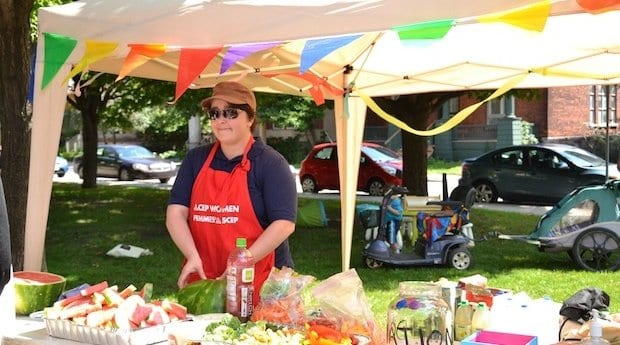
The march was followed by a picnic in Minto Park. Credit: Julie Cruikshank
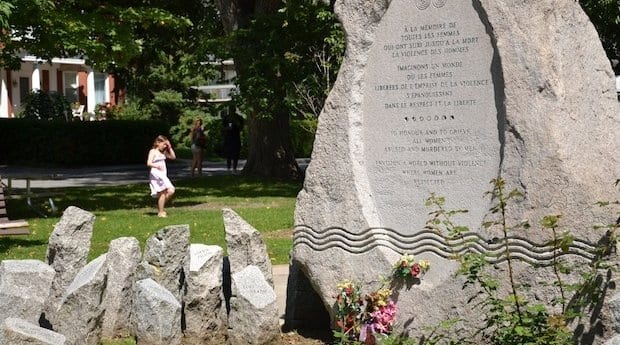
Ottawa Dyke March 2014. Credit: Julie Cruikshank
Members of Ottawa’s dyke community took to the windy streets Saturday, July 23, marching through the Village in a show of pride and solidarity at the 10th annual Ottawa Dyke March. Though their numbers seemed smaller than in previous years, the marchers represented a diverse group of ages and backgrounds. Many said they appreciated the organic, grassroots feel of the event.
The day began with a rally at the Canadian Monument to Human Rights on Elgin Street, followed by a march down Lisgar, Bank and Gilmour streets and ending with a picnic in Minto Park. Dyke March organizer Sarah Manns began the rally by thanking members of the Algonquin nation for the use of their unceded territory.
“We rally as a community to protest the commercialization of queer culture and dyke discrimination,” Manns told the crowd assembled at the Human Rights monument. “We gather to stand together to respect, to support, to make our voices heard and to build each other up. We march because the struggles are not over.”
Amanda Ryan, chair of the Gender Mosaic outreach committee, spoke at the rally, thanking the organizers of the march for including the transgender community. “It’s about inclusion. So often trans people feel left out of many different events, and it’s quite an honour to be included in a . . . lesbian march.”
Ryan says that she feels trans inclusion has been very good at this year’s Pride and that she finds the trans community tends to be well represented in Ottawa. “I would love to see a trans march here,” she adds.
City council hopeful Catherine McKenney, who attended the march with her wife and daughter, also addressed the crowd at the rally. Her speech focused, fittingly, on women in politics. “I often lament that we don’t have enough strong women on city council, so I decided to do something about it,” she said.
McKenney told the crowd that her decision to run for city council was informed partly by her role as the parent of a young daughter and that although she has faced criticism as a public figure, it is a small price to pay. “I would rather have my feelings hurt than have my daughter and [your] daughters still deal with violence against women, pay equity, childcare and all of the issues that we’ve been dealing with for the last 30 years,” she said. “It’s got to change.”
The march drew a large number of queer families, many of whom brought their young children in strollers and bicycle trailers.“[We aim] to make [the Dyke March] accessible for parents and for people to be able to bring their kids,” Manns says. “It’s nice for kids to be able to know that there are other families that look like their families.”
Caitlyn Pascal and Ariel Troster brought along their daughter, Daphne, 2, who sported a T-shirt proclaiming, “I love my two moms.” “Daphne’s lucky enough that she has a lot of friends that have two moms, or two dads or one mom, so we bring her here so she can see the diversity of the community,” Troster says. “For her, it’s a big party.”
The march is also an opportunity for the family to be politically involved and remember their roots, Troster says. “We’re really lucky that we have the right to be parents to this awesome kid, and if it weren’t for the people that came before us we wouldn’t be able to do that.”
Prostitutes of Ottawa-Gatineau: Work, Educate and Resist (POWER) also took part in the march. “There are many people within the sex-working community that identify as queer, so it’s really important that queer people get on board with sex-worker human rights,” said POWER vice-chair Katherine Van Meyl, whose mother accompanied her to the march. “I think it’s really important that we have a presence at these sorts of events to show the general community that we’re here, that a lot of us are queer, and that it’s important to support our rights.”
Members of the Ottawa Police Service were present at the march, as per a city bylaw that mandates their presence at special events on city streets. “They show up for any sort of demonstration,” Manns says. “It’s not a situation where we have a lot of choice about the police being here or not being here. The police will be here because we are a large crowd of people marching on the road.”
Officers on motorcycles stopped traffic to allow marchers to pass safely, though some people said they found this intrusive. “I found that the cops were taking up a lot of space and it was really unnecessary for them to be doing that,” marcher Lauryn Kronick said.
“Motorcycles are really quite unnecessary,” Dyke March organizer Joanne Bradley says. “I don’t find that they’re very sensitive to the fact that their presence can be really unsettling to a lot of people in our community.” She says Dyke March organizers would prefer the officers use bicycles.
“I was somewhat concerned about it as a safety issue, because they were riding very, very close to people,” Manns says. “I think that’s something that I will let the city know about just because we want to ensure that everyone can participate safely, and we wouldn’t want there to be any sort of accident.”
Organizers attributed the somewhat lowered turnout to some people choosing to attend LGBT events at the People’s Social Forum, an activist demonstration taking place in Ottawa concurrently with Pride. Manns also noted that the cost of a City of Ottawa parade permit, which would have allowed vehicles to take part in the march, prevented them from asking the Dykes on Bikes to participate.
“[The city doesn’t] even allow accessibility vehicles, which is a problem we’ve tried to address with them, but we haven’t had any success,” she says. The Dyke March operates with a City of Ottawa special events permit.
A community picnic was held in Minto Park following the march. A play area was set up for the children in attendance, and the barbecue was shared with members of the homeless community who frequent the park. “It’s nice to be able to feed people and make it an inclusive space,” Manns says. “It’s nice to be able to share what we have.”
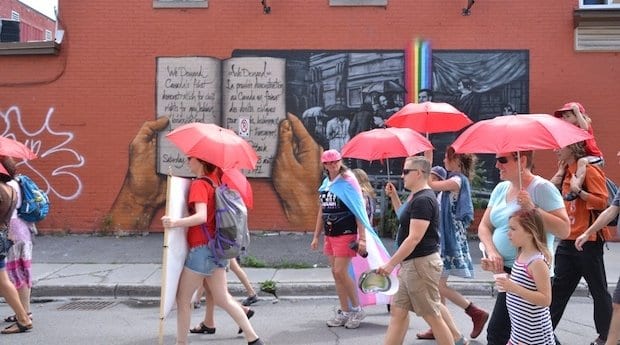

 Why you can trust Xtra
Why you can trust Xtra


